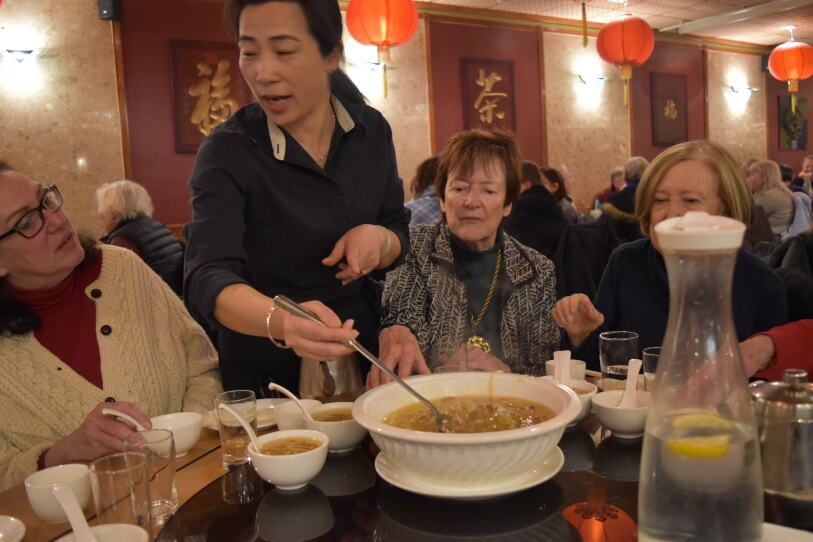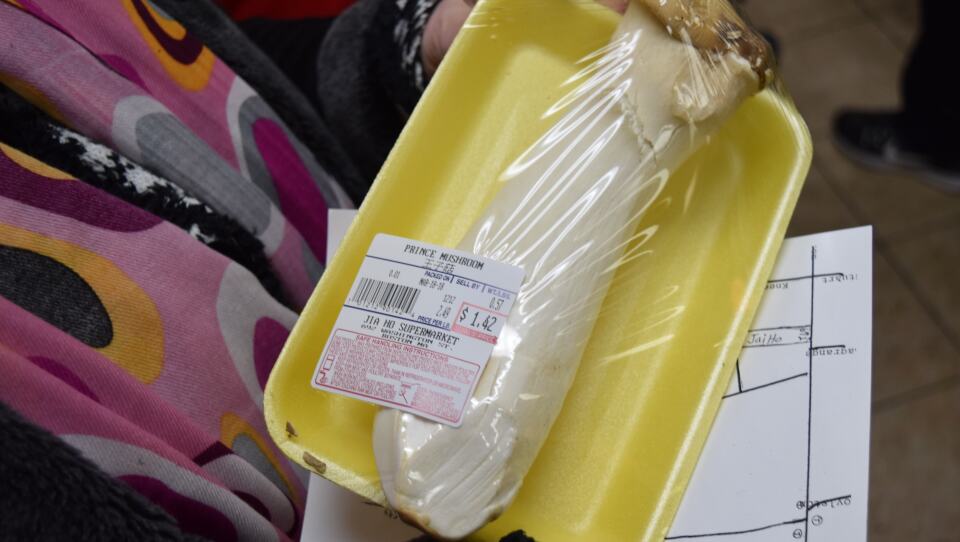It probably feels like it’s been a long winter, and a lot of us are impatient for spring to really start up. And that’s especially true for members of the nation’s oldest mycological — or mushroom — club, which is right here in Boston. Club members spend the warmer months wandering the woods of Massachusetts, searching for their favorite fungi. But when mushroom enthusiasts start to get edgy in the off-season, they go searching for them in a very different environment.
A crowd of about 40 mushroom hunters gathered on a recent Sunday morning, ready to do their favorite thing, in an usual place. Since it’s not mushroom season in the wild, for this day, the Boston Mycological Club will search for fungi in the markets of Boston’s Chinatown.
“Finding mushrooms in the woods is kind of like a treasure hunt," David Babik said. "There's hundreds of thousands of varieties in our area, many of which have never been documented, and to go out and find stuff and figure out what you found is really — it's exciting, kind of challenge.”
But the mushroom season runs from about late June through October. So for months now, there’s been nothing to find. “Everybody is anxious to get out looking for mushrooms again," Babik said. "So it's end of the winter, just when you can't stand it anymore, you head out.”
They hit the streets of Chinatown, where around every corner it seems like there’s another store selling all kinds of mushrooms you won’t find in Star Market. Some of the group walked into Jia Ho Supermarket, where, locked in a glass case, are small containers of dried mushrooms.
“Are those cordyceps? I didn’t know you could buy those. Do people actually eat them?" asked club member Heidi Unruh. One small package of the dried mushrooms was labeled at $699. Babik explained these crazy expensive mushrooms start out as a fungul parasite in moths. The price comes from their rarity and the extreme difficulty of finding them on barren hillsides, high in the Himalayas in Tibet.
“So the mushroom has infiltrated the larvae of the moth and is taken over its nervous system and gradually taking control of it, eaten the insides out, and become a mushroom," Babik said. "It's grown a big fungus fruiting out of it. And it's supposedly super medicinal properties.”
They also exist in ants and caterpillars, and can actually control their behavior. “But that's our future," Babik joked. "Someday they'll take over us.”
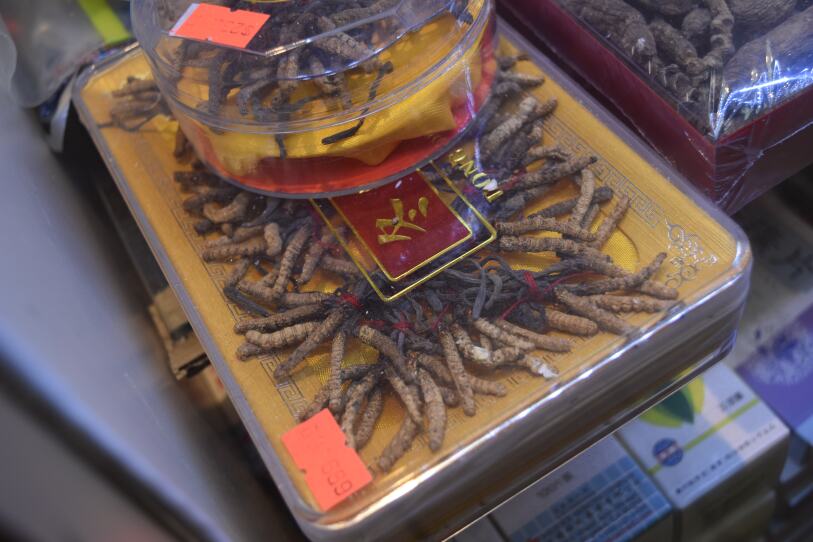
More than a dozen varieties of mushrooms imported from Asia filled the refrigerated display, ranging from small, delicate ones to some bigger than a microphone.
“I would like to find some turkey tails while we’re here," Unruh said, sending them in the direction of an herbalist shop down the road, with bins full of mushrooms, some as big as hubcaps. Unruh spotted one she’s seen in the wild. “I find them all the time. Ganodermas. Do you buy them?” she asked a store employee.
Another potential benefit of mushroom hunting — some people can make money at it. Unruh exchanges contact information with the manager and heads out. “Yeah that was a surprise," she said. "I didn't know they sold for that much money, which was great.”
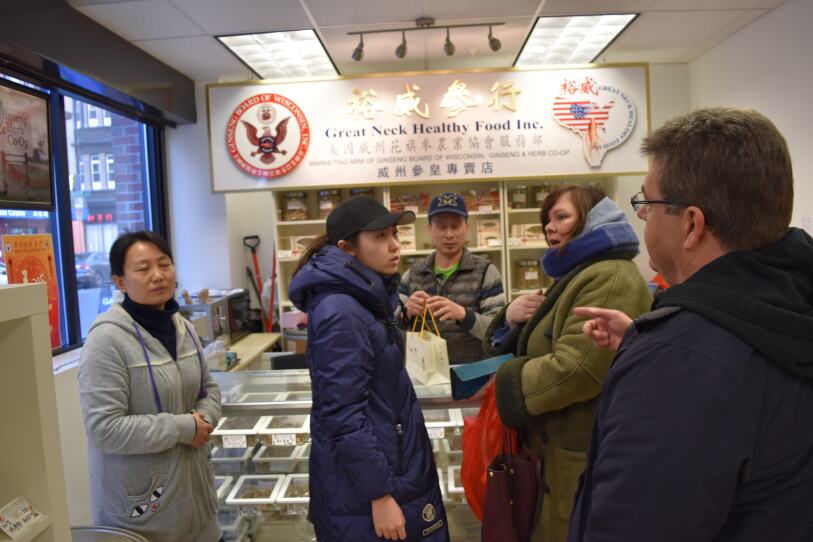
In another herbal shop around the corner, Benjamin Malleson, a club member in a cowboy hat and wispy white beard struggled to read the Chinese language on a bag of dried mushrooms. Even in this group of mushroom enthusiasts, Malleson has the air of an expert. He’s a mushroom dealer, who sells to restaurants in Boston. And he was wearing a belt buckle he made himself from a mushroom.
“I think it's Fomes Fomitopsis. But I have never been able to get anybody to confirm that ID," he said. "Yeah, it's totally cool.”
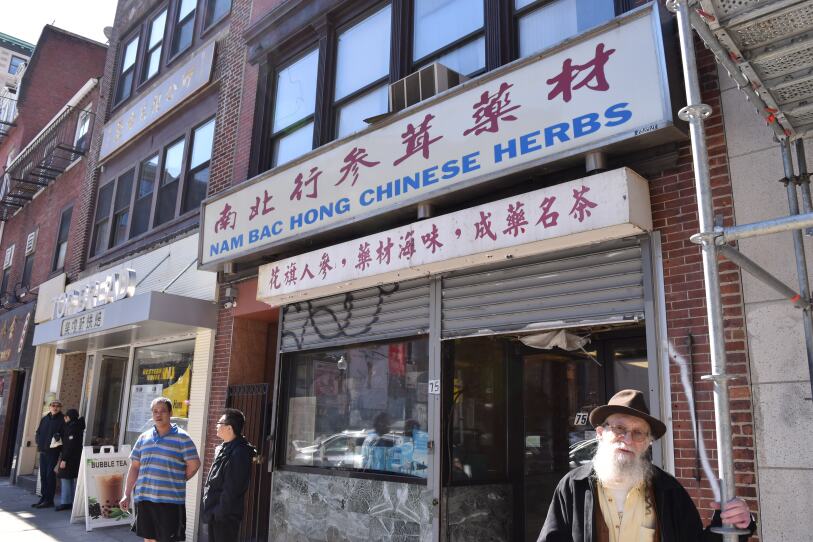
The Boston Mycological Club’s been studying mushrooms since 1895. And here in Chinatown, they can explore and appreciate a culture that’s been using them for a whole lot longer. Club member Christina Chang sees it all from the perspective of the Chinese culture, and the mycoglogial subculture. “As Chinese we eat mushrooms all the time," she said. "And we’re vegetarians [in my family] so mushrooms are important source.”
Everyone in the club seems to have their own unique spark that ignited their mushroom fascination. “I look after to patients with HIV and infections, and look after some patients with fungal infections in transplants," Chang said. "So that's why fungus that you eat and fungus that you have in the environment, and how it causes infections, is very interesting. But more importantly, eating’s very good.”
And that’s how the day ends. After fanning out across Chinatown, the club meets back up at a restaurant here for a 10-course mushroom feast.
For some in the group, the allure of mushrooms is the treasure hunt. Others love their beauty, or the challenge of identifying their scientific taxonomy. But as the feast comes out one course at a time, everyone celebrates the many different flavors of mushrooms. And yes, the meal does include a soup full of cordyceps, which might possibly have been cultivated without the assistance of a zombified caterpillar, but could have come from there.
And, as one WGBH reporter can confirm, it was delicious.
